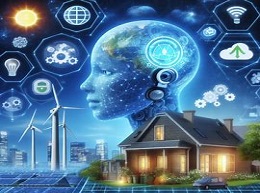AI and Energy: Optimizing Resource Consumption and Sustainability

AI in Energy: Sustainable Resource Optimization
The global energy sector is undergoing a profound transformation driven by technological advancements, policy changes, and environmental concerns. As the world seeks to transition to cleaner and more sustainable energy sources, Artificial Intelligence (AI) emerges as a powerful tool for optimizing resource consumption, enhancing efficiency, and reducing environmental impact. In this article, we'll delve into the role of AI in the energy sector, exploring innovative applications, benefits, and examples of how AI is revolutionizing resource optimization and sustainability.
AI in Energy: AI technologies are revolutionizing the energy sector by enabling more efficient generation, distribution, and consumption of energy resources. From optimizing power grids to maximizing renewable energy output, AI-driven solutions are transforming the way energy is produced, managed, and utilized, paving the way for a more sustainable and resilient energy future.
Optimizing Power Generation: AI algorithms analyze vast amounts of data from energy generation systems, weather forecasts, and demand patterns to optimize power generation and distribution. For example, predictive analytics models forecast electricity demand, allowing utility companies to adjust power generation accordingly and minimize waste. Additionally, AI-powered control systems optimize the operation of power plants, turbines, and renewable energy sources to maximize efficiency and reduce emissions.
Smart Grid Management: AI technologies enhance the efficiency and reliability of power grids through smart grid management solutions. These solutions leverage AI algorithms to monitor grid conditions, predict potential failures, and dynamically adjust power flow to optimize performance and prevent disruptions. By integrating AI into grid management systems, utilities can improve energy reliability, reduce downtime, and better accommodate fluctuations in demand and supply.
Energy Storage Optimization: AI plays a crucial role in optimizing energy storage systems, such as batteries and pumped hydro storage, to maximize efficiency and longevity. Machine learning algorithms analyze historical data and real-time performance metrics to optimize charging and discharging cycles, prolong battery life, and enhance overall energy storage capacity. Additionally, AI-driven predictive maintenance systems identify potential issues early, minimizing downtime and ensuring optimal performance of energy storage assets.
Renewable Energy Forecasting: AI-powered forecasting models accurately predict renewable energy generation from sources such as solar, wind, and hydroelectric power. These models analyze weather data, historical generation patterns, and environmental factors to forecast energy output with high precision. By providing reliable forecasts, AI enables utilities to better integrate renewable energy into the grid, optimize energy trading, and reduce reliance on fossil fuels.
Demand Response and Energy Efficiency: AI-driven demand response programs optimize energy consumption by incentivizing consumers to adjust their usage patterns based on real-time pricing and demand signals. Smart thermostats, appliances, and energy management systems use AI algorithms to analyze usage patterns and adjust settings automatically to reduce energy consumption during peak demand periods. By encouraging energy efficiency and load flexibility, demand response programs help balance supply and demand on the grid and reduce overall energy costs.
In conclusion, AI is revolutionizing the energy sector by optimizing resource consumption, enhancing efficiency, and fostering sustainability. From optimizing power generation and grid management to maximizing renewable energy output and promoting energy efficiency, AI-driven solutions are transforming the way energy is produced, distributed, and utilized. As the world transitions to a cleaner and more sustainable energy future, AI technologies will continue to play a vital role in driving innovation, reducing environmental impact, and ensuring a greener and more resilient energy ecosystem.